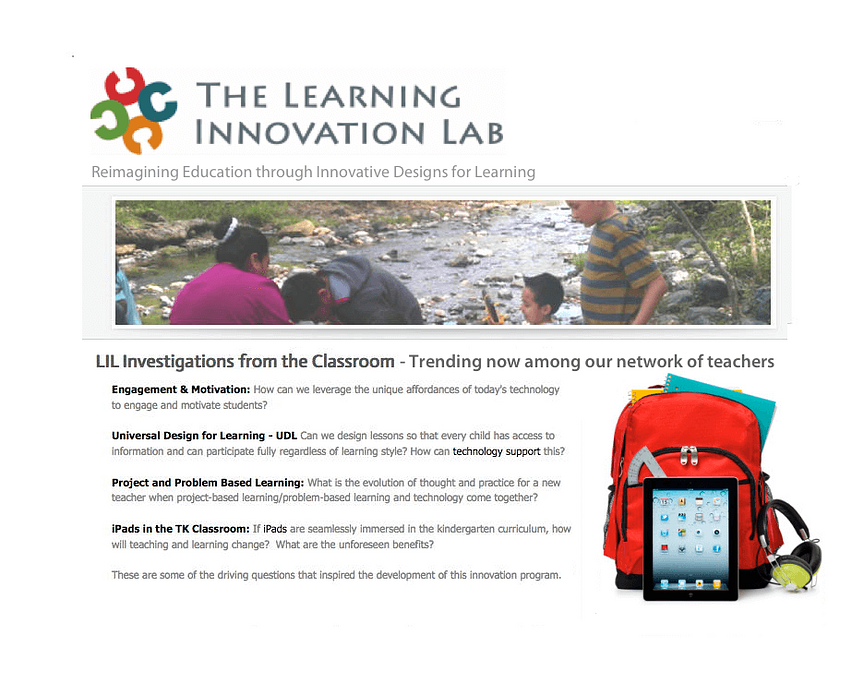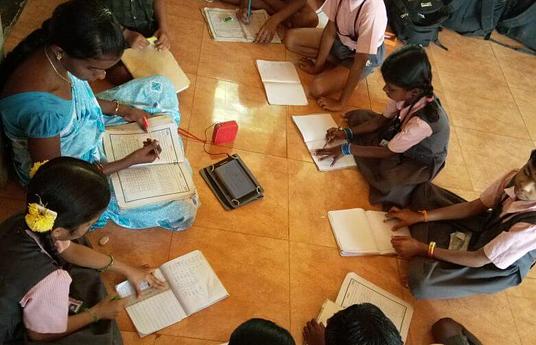The Learning Innovation Lab is the capstone exhibit hall for the Innovative Learning Master’s degree program in the Graduate School of Education at Touro University California. Formerly a traditional face-to-face educational technology program focused on teacher use of technology, the Innovative Learning program emphasizes student-centered learning and growth driven by deep reflection on teaching practices. Each teacher who enters our program embarks on a journey designed to move them from classroom practitioner, to action researcher, to teacher leader. Created to meet local school district needs for teacher leaders of project-based learning, innovative curriculum design, and creating a classroom culture essential to nurture 21st century learning, we strive to create a safe playground in which teachers can explore new ways of teaching and learning without risk. Because the program draws teachers from every level of experience, proficiency in the use of technology, and level of comfort with the “messiness” of change and unpredictable outcomes, we encourage cohort members to acknowledge and honor each teacher’s starting point and nurture individual progress through the adventure of becoming more innovative no matter their stage of proficiency.
We begin by asking candidates to share a local learning challenge as the basis for their investigation. This evolves into an essential or driving question that is explored and refined through multiple cycles of design thinking and action research over the course of the program. Along the way, potential methods for improving student learning through innovation are developed and evaluated for effectiveness and refined as needed. Simultaneously, a myriad of digital tools and guiding principles, theories and research are explored. As in most inquiry-based learning processes, candidates are encouraged to make their work public for feedback via a variety of arenas including professional development venues, social media, web presence and conferences. Over time, the journey toward completion culminates with producing a LIL exhibit including a 90 second “elevator speech” video and a 5 minute capstone overview video. This is accompanied by research data and other media developed over the course of the program that communicate their methods and findings. We ask all candidates to give back to their district or school by sharing their work with colleagues - especially since they investigated a local challenge. NapaLearns Fellows do this more formally via the NapaLearns web site and teacher professional development opportunities they host across the county.
NapaLearns and the Fellows
While the Innovative Learning Master’s degree program is open to any candidate who meets enrollment standards, teachers employed in one of Napa County’s five school districts in California are eligible for tuition assistance from NapaLearns, a non-profit organization committed to "partnering for innovation and success". Once accepted by Touro and approved by NapaLearns, candidates become a NapaLearns Fellow. NapaLearns also generously provides direct support to the Touro program by sharing their video and graphics development resources thereby allowing us to document fellows activities and responses to the program.
Program Organization
This cohort-based program immerses teachers in the same environment school administration asks them to create in their own classrooms – one in which problem-based learning, project-based learning and/or inquiry are used to spark student learning. Meetings are held face-to-face virtually using web-conferencing several hours each week. This time is reserved for sharing insights, demonstrating creations and making connections to personal practice. All direct instruction is conducted via recorded “homework” videos and other resource materials hosted online. Each week, after reviewing course materials, teachers blog about how the content related to their own practice; making personal connections to the ideas and theories. They read and comment on each others’ blogs to build connections to each other and a larger perspective on the content. These blogs become a journal of the evolution of thought and practice for each teacher and serves to provide a method for documenting their journey.
Continuous Improvement Fuels Innovation
To maintain either regional or national accreditation, higher education institutions are required to utilize data to inform improvement in their courses and programs. Beyond the usual course evaluations, faculty observations and alumni surveys, the Innovative Learning program receives ongoing and continuous feedback from our non-profit partner, current alums teaching in the program, and school district personnel. We consider such input opportunities for improvement, evolution and/or innovation. We invite NapaLearns and School District administrator to fellows presentations of their initial research projects in the first semester, engage our partners in giving input into the design cycles for solutions, and to celebrate the final demonstrations of capstone projects and research posters.
Putting Theory into Action - Organizations and theorists who influenced our program design.
KnowledgeWorks
Initial founders of Knowledgeworks are members of the community in which this program is based. Their focus on student-centered learning and personalization as tools to impact and improve learning for all students inspired the design of the Innovative Learning Master's degree program.
P21.org
The 4Cs of 21st century learning developed by the P21 partnership guide this program: Communication, collaboration, creativity and critical thinking. Our largest school district partner, Napa Valley Unified, expanded the 4Cs to include: Global citizenship and character. Others consider cultural competency as an essential C. We ask our teacher participants to address how their lesson designs support students to acquire competency in the essential 4C skills necessary their future success.
League of Innovative Schools - Digital Promise
As a member of the League, one of our partner school districts shared their development of rubrics for measuring student proficiency in the 4Cs. Initially created to measure proficiency of exiting high school students, this district brought together classroom teachers and academic specialists to create derivative rubrics to be used to guide primary, middle and early high school progress toward mastery of the essential Cs. We encourage our teachers to employ these rubrics as they develop lessons to expand student proficiency in these areas and measure the efficacy of their projects.
TPACK
TPACK is an acronym for Technology Pedagogy and Content Knowledge. Developed by Punya Mishra and Matt Koehler while at Michigan State University, the TPACK framework “attempts to identify the nature of knowledge required by teachers for technology integration in their teaching, while addressing the complex, multifaceted and situated nature of teacher knowledge" (tpack.org). It is the tension between and intersection of each of these areas of knowledge that challenge teacher design of learning opportunities using technology. In the program, we explore the tenets of TPACK and ask each teacher to contemplate their journey toward developing TPACK skills as they move through and complete their studies.
Universal Design for Learning (UDL) - Inclusiveness for Everyone
UDL is a framework for addressing the learning needs of all students in the classroom. Rather than create modifications for some (which highlight their differences), we advocate for creating lessons with sufficient resources to allow multiple entry and exit points for learners with differing abilities and learning strengths. This inclusiveness in design has the added benefit of modeling for students the benefits of multiple perspectives and the richness of understanding this brings to one's knowledge of a topic. It values the thinking of every student, emphasizes equity, and elevates engagement in learning.
Program Impact
- Use of project-based learning (as well as problem/inquiry based learning) design and inquiry challenges both teaching faculty and established institutional policies. Yet, it provides exemplars of, and provocations for, innovation for both the teacher and the learner.
- The program encouraged expansion of school-based learning to home-school networks, independent schools, after-school programs, parent education and community-based learning programs.
- One hundred and fifty NapaLearns Fellows completed the program with 99% on time completion.
- Of these, approximately one in three graduates went on to be promoted to a leadership position within their school district in the roles of trainer/coach, district administrator, and/or technology coordinator.
- Twelve teachers were nominated for teacher of the year awards.
- The superintendent of the largest district involved named the Master’s program as a major contributor to whole school reform in his district.

.jpg)

